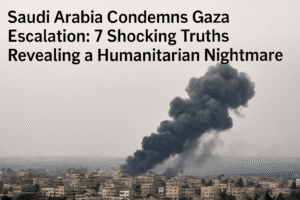Saudi Arabia Condemns Gaza Escalation: 7 Shocking Truths Revealing a Humanitarian Nightmare
Saudi Arabia has vehemently condemned Israel’s intensified military operations in Gaza, warning that expanding ground incursions into northern and southern regions—including areas like Khan Younis and Rafah—violate international law, exacerbate humanitarian suffering, and undermine global peace efforts. The Kingdom emphasized that such actions defy UN resolutions, disregard civilian protections under the Geneva Conventions, and risk destabilizing regional security. Over 1.4 million displaced Palestinians, already enduring famine and collapsing healthcare systems, face renewed bombardment in zones once declared “safe,” with casualties surpassing 35,000 since October 2023.
Saudi officials linked Israel’s tactics to broader systemic failures in enforcing accountability, urging the international community to prioritize ceasefires, aid access, and a credible path to Palestinian statehood. The condemnation highlights Riyadh’s strategic balancing act: advocating for Palestinian rights while navigating U.S.-mediated normalization talks with Israel, which it conditions on irreversible concessions to Palestinians.
As global divisions deepen—with the EU and UN demanding adherence to humanitarian law, and the U.S. pausing select arms shipments—Saudi Arabia positions itself as a vocal advocate for multilateral solutions, stressing that military escalation only perpetuates cycles of violence. The crisis underscores an urgent need for cohesive global action to halt civilian suffering and revive stalled diplomatic frameworks for a two-state resolution.

Saudi Arabia Condemns Gaza Escalation: 7 Shocking Truths Revealing a Humanitarian Nightmare
As smoke billows over Khan Younis in southern Gaza, Saudi Arabia has issued a forceful condemnation of Israel’s intensified military operations, decrying the expansion of ground incursions into both northern and southern regions of the besieged enclave. The Kingdom’s Foreign Ministry underscored that these actions not only defy international consensus but also breach fundamental principles of human rights and UN charters, exacerbating a humanitarian catastrophe and undermining prospects for regional stability.
Context of Escalation
Recent weeks have seen a surge in Israeli airstrikes and ground operations, particularly in Rafah and Jabalia, areas previously designated as “safe zones” for displaced Palestinians. Over 1.4 million Gazans, already displaced multiple times, now face renewed bombardment, with reports of civilian casualties and destruction of critical infrastructure, including hospitals and water facilities. The timing of Saudi’s statement—amid stalled ceasefire talks and U.S.-led mediation efforts—highlights growing frustration over the failure to curb violence.
Saudi Arabia’s Firm Stance
The Kingdom’s critique goes beyond rhetoric, framing Israel’s operations as a violation of international humanitarian law, particularly the Fourth Geneva Convention, which prohibits targeting civilians during conflict. Saudi officials emphasized that such operations “directly assault Palestinian rights” and contravene recent UN Security Council resolutions calling for immediate ceasefires and unhindered aid access. This stance aligns with Riyadh’s longstanding support for Palestinian statehood, even as it navigates delicate normalization talks with Israel, mediated by the U.S.
Humanitarian Catastrophe Deepens
UN agencies report that 85% of Gaza’s population is now internally displaced, with famine risks escalating due to blocked aid routes. Over 35,000 Palestinians have been killed since October 2023, according to Gaza’s Health Ministry, while aid workers warn of collapsing healthcare systems. Saudi Arabia’s statement echoes concerns from organizations like Amnesty International, which accuse Israel of using “starvation as a weapon of war”—a charge Israel denies, blaming Hamas for diverting resources.
International Reactions and Divisions
Saudi Arabia’s condemnation joins a chorus from Arab states, including Egypt and Jordan, while the EU and UN Secretary-General António Guterres have repeatedly called for adherence to international law. Conversely, the U.S. continues to supply military aid to Israel, though recent pauses in weapon transfers signal growing unease. This divide underscores a fragmented global response, with Global South nations increasingly vocal about perceived double standards in enforcing humanitarian norms.
Expert Insights: Why Saudi’s Voice Matters
Analysts suggest Saudi Arabia’s outspokenness reflects strategic priorities. “Riyadh is balancing its Vision 2030 goals, which require regional stability, with domestic and pan-Arab pressures to support Palestine,” says Dr. Aziz Alghashian, a Gulf foreign policy expert. The statement may also aim to bolster Saudi leadership among Muslim-majority nations ahead of critical diplomatic forums, such as the upcoming Arab League summit. Notably, the Kingdom has not halted its U.S.-backed normalization talks with Israel, signaling a nuanced approach that ties progress to tangible benefits for Palestinians.
Implications for Peace and Diplomacy
The escalation complicates already fraught normalization efforts. Saudi Arabia has consistently linked diplomatic relations with Israel to irreversible steps toward Palestinian statehood—a demand at odds with the current Israeli government’s stance. As violence persists, Riyadh’s ability to mediate or endorse agreements diminishes, potentially delaying economic and security collaborations envisioned under U.S.-brokered deals.
A Call for Accountability
Saudi Arabia’s appeal to the “will of the international community” spotlights urgent calls for accountability. Legal scholars point to the International Court of Justice’s ongoing genocide case against Israel, filed by South Africa, as a pivotal test of global governance. Meanwhile, grassroots movements worldwide demand sanctions and arms embargoes, illustrating mounting public pressure to prioritize human security over geopolitical interests.
Conclusion: A Crisis Demanding Action
As Gaza’s humanitarian toll mounts, Saudi Arabia’s condemnation amplifies a stark message: military solutions will not secure lasting peace. The path forward, experts argue, requires enforceable ceasefires, unrestricted aid, and renewed commitment to a two-state solution. For Riyadh, leveraging its diplomatic clout to bridge divides remains critical—not only for regional stability but to uphold the international order it seeks to champion. The world watches whether words will translate into collective action before more lives are lost.
You must be logged in to post a comment.